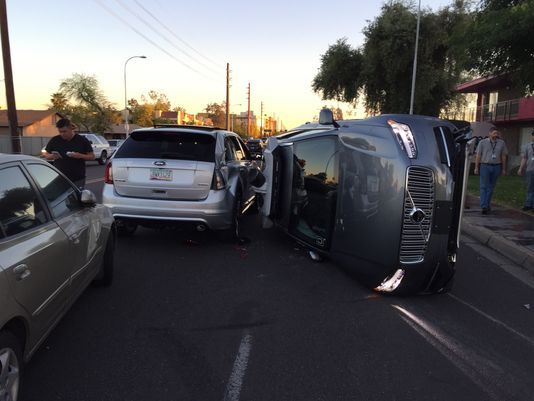Computer, I’m Drunk. Drive Me Home?

Credit to Author: Daniel Oberhaus| Date: Wed, 04 Oct 2017 19:21:26 +0000
The Australian National Transport Commission released a report this week that argued that the operators of fully self-driving cars should be exempt from laws that restrict driving under the influence of alcohol or drugs. That’s right—the NTC doesn’t think it should be a problem if the person behind the wheel wants to crack open an ice-cold Foster’s as they’re whisked away to their destination in an autonomous vehicle.
“One potential barrier to receiving the full benefits of automated vehicles would be to require occupants of automated vehicles, who are not driving, to comply with drink-driving laws,” the report notes. “This would create a barrier to using a vehicle to safely drive home after drinking.”
Since all self-driving cars still allow their operators to override autonomous systems, the NTC acknowledges that allowing an intoxicated person to ride home in a self-driving car could actually create a greater road-risk if that person decides to take over driving. In these cases, the NTC argues that DUI laws would still apply. As a result, the report concludes that there are only benefits to allowing intoxicated people to operate a self-driving car in cases where there is no possibility that the person could take control of the vehicle.
The report is the result of a 2016 NTC directive to reform transportation legislations so that Australians can derive the full benefits of self-driving cars. According to the report, autonomous vehicles are already being tested on Australian roads and the NTC estimates that they will become commercially available around 2020. The report offers a number of reforms for current driving laws, which the NTC believes are inadequate to address our self-driving future since all of these laws presume a human is in control of the vehicle.
In addition to DUI reform, the report also addresses questions like whether the operator of an autonomous vehicle should be considered in control of the car and whether current definitions of ‘driver’ and ‘drive’ apply to self-driving cars.
Although a number of ride sharing companies, automobile manufacturers, and Silicon Valley companies are racing to develop and deploy self-driving cars as soon as possible, the dream of a car driving you home from a night at the bar has been delayed by technical and legal setbacks.
Last year, the ethical questions surrounding self-driving cars really entered the public consciousness by way of the famous “trolley problem” in ethical philosophy. The question, in short, is whether an autonomous should take an evasive maneuver that would kill its passenger if it were, say, about to hit a group of school children crossing the street. This question, along with those broached in the NTC report and other mundane regulatory concerns will need to be answered before we see fully self-driving cars take over the streets.
In my hometown of Phoenix—a major testbed for autonomous vehicles being developed by Uber and Waymo—it’s not uncommon to see self-driving cars on the streets anymore. A few months ago, a self-driving Uber was involved in a collision in the intersection outside of my apartment. The car had been T-boned while making a turn by a human driver that hadn’t been paying attention to the road. While no one was hurt, it’s potentially fatal accidents that result from negligence or intoxication that self-driving cars aim to eliminate.
Read More: People Want Autonomous Cars to Protect the Greater Good, But Only After Them
It’s a noble goal, to be sure, but the tech that will drive (lol) this revolution has a ways to go. As Recode reported earlier this year, during one week in March Uber’s 43 active self-driving cars autonomously drove a collective record of 20,354 miles. Impressive, but the devil is in the details—the driver behind the wheel had to take control of the car once every 0.8 miles.
The NTC’s argument that DUI laws shouldn’t apply to the operators of self-driving cars only apply in cases where there is no option for a person to operate the vehicle. Clearly, the technology is not at the point where such a law would apply to any self-driving vehicle operator yet, but based on the progress that self-driving tech has made in the last few years, it may not be long before you’re legally sipping brews behind the wheel.
https://motherboard.vice.com/en_us/rss